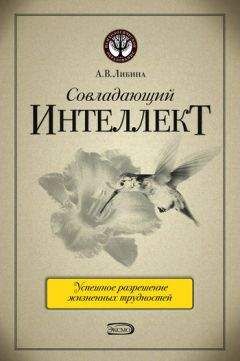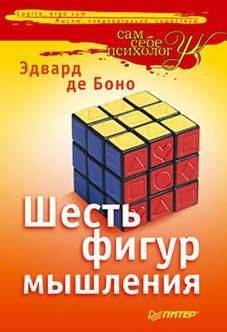Алена Либина - Совладающий интеллект: человек в сложной жизненной ситуации

Помощь проекту
Совладающий интеллект: человек в сложной жизненной ситуации читать книгу онлайн
Libin, A., Cohen-Mansfield, J. (2001). Matching interventions for the individualized treatment in dementia. Poster presented at the GSA 54th annual scientific meeting. November 15–18. Chicago
Libin, A., Libin, E., Ojika, T., Nishimoto, Y., Takeuchi, T., Matsuda, Y., Takahashi, Y. (2002). On Person – Robot Interactions: Cat NeCoRo Communicating In Two Cultures (Phase 1. USA – Japanese study). Proceedings of the 8th International Conference on Virtual Systems and Multimedia, Creative Digital Culture, VSMM Society, Seoul, pp. 899–905.
Libin, E. (2006). Coping Intelligence Questionnaire (CIQ). Monographs of the International Coping Institute, Ltd., 15, Chevy Chase, MD.
Libin, E. (2004). Coping Intelligence: Methodological and practical applications. Monographs of the International Coping Institute, Ltd., 16, Chevy Chase, MD.
Libin, E. (2004). Life Satisfaction Scale: A new assessment for education and psychological practice. Monographs of the International Coping Institute, Ltd., 17, Chevy Chase, MD.
Libin, E. & Libin, A. (2002). Robotherapy: Definition, Assessment, and Case Study. Proceedings of the 8th International Conference on Virtual Systems and Multimedia, Creative Digital Culture, VSMM Society, Seoul, pp. 906–915.
Libin, E. V., Libin, A. V. (1996). The Concept of Human Style: An Interactionists Approach. Paper presented on the YI-th Conference of ISSID. Warsaw.
Libin, E., Libin, A. (1995). Construction of the Coping Multidimensional Personality Inventory. 3rd ECPA, Trier, Germany.
Locker, J., Cropley, M. (2004). Anxiety, Depression and Self-Esteem in Secondary School Children.An Investigation into the Impact of Standard Assessment Tests (SATs) and Other Important School Examinations. School Psychology International, Vol. 25(3), 333–345.
Mayer, J. D. & Solovey, P. (1997). What is Emotional Intelligence? In. P. Solovey, D. Sluyter (Eds.), Emotional development and emotional Intelligence. New York: Harper Collins, 1997, 3–31.
Maslow, À. Í. (1955). Deficiency motivation and growth motivation. In: Jones R. M. (Ed.). Nebraska symposium on motivation. Lincoln, 1–30.
Marshall, G. N., & Lang, E. L. (1990). Optimism, self-mastery, and symptoms of depression in women professionals. Journal of Personality and Social Psychology, 59, 132–139.
Matthews, G.; Zeidner, M. (2000). Emotional intelligence, adaptation to stressful encounters, and health outcomes. Bar-On, R. (Ed);
Mcevoy, A., Welker, R. (2000). Antisocial Behavior, Academic Failure, and School Climate: A Critical Review. Journal of Emotional and Behavioral Disorders, Fall.
Myers, M. T. (2001). Preparing students for an uncertain future. Liberal Education, 87(3), 22–25.
Palfai, T. P., & Salovey, P. (1993). The influence of depressed and elated mood on deductive and inductive reasoning. Imagination, Cognition, and Personality, 13, 57–71.
Parker, J. D. (Ed). The handbook of emotional intelligence: Theory, development, assessment, and application at home, school, and in the workplace. San Francisco, CA, 459–489.
Miceli, M.; Castelfranchi, C. (2001). Further distinctions between coping and defense mechanisms? Journal of Personality, Vol. 69(2), 4, 287–296.
Michel, W. (1969). Personality and assessment. New York.
Moos, R. H. (Ed.). (1986). Coping with life crises: An integrated approach. New York: Plenum Press.
Nezu, A. M; Nezu, C. M. & Bhssett, S. E. (1988). Sense of humor as a moderator of the relation between stressful events and psychological distress: A prospective analysis, Journal of Personality and Social Psychology, 54, 520–525.
Parkes, K. R. (1984). Locus of control, cognitive appraisal, and coping in stressful episodes. Journal of Personality and Social Psychology, 46, 655–668.
Prepost, F. (1989). Humor as an intervention strategy during psychological treatment: imagery and incongruity. J. Psychology, 26, 4, 34–40.
Price, R. H. (1981). Risky situations. Toward a psychology of situations: An interactional perspective. Hillsdale, 18–32.
Reed, J. H., & Kromrey, J. D. (2001). Teaching critical thinking in a community college history course: Empirical evidence from infusing Pauls model. College Student Journal, 35(2), 201–215.
Rim, Y. (1989). Sense of humor and coping styles. J. Personality and Individual Differences, 9, 3, 559–564.
Ross, L. (1977). The intuitive psychologist and his shortcomings: Distortions in the attribution process. In L. Berkowitz (Ed.), Advances in experimental social psychology New York: Academic Press, Vol. 10, 173–220.
Rotter, J. B. (1966). Generalized expectancies for internal versus external control of reinforcement. Psychological Monographs, 80 (1, Whole No. 609).
Rusalov, V. M. (1989). Object-related and communicative aspects of human temperament: A new questionnaire of the structure of temperament. Journal of Personality and Individual Differences, 10, 8, 817–829.
Salovey, P., Hsee, C., & Mayer, J. (1993). Emotional intelligence and the self-regulation of affect. In: D. Wegner & J. Pennebaker (Eds.), Handbook of mental control (pp. 258–277). Englewood Cliffs, NJ: Prentice-Hall.
Salovey, P. & Sluyter, D. (Eds). (1997). Emotional Development and Emotional Intelligence: Implications for Educators. New York: Basic Books, 3–31.
Salovey, P. & Mayer, J. D. (1990). Emotional intelligence. Imagination, Cognition, and Personality, 9, 185–211.
Scheier, M. F. & Carver, C. S. (1992) Effects of optimism on psychological and physical well-being Theoretical overview and empirical update. Cognitive Therapy and Research, 16, 201–228.
Scheier M. F., Matthews K. A., Owens J. F., Schulz R., Bridges M. W., Magovern G. J., Carver C. S. (1999). Optimism and rehospitalization after coronary artery bypass graft surgery. Arch Intern Med. Apr 26; 159(8):829-35.
Scheier, M. F., Matthews, Ê. A., Owens, J. F., Magovern, G. J., Lefebvre, R. C., Abbott, R. A. & Scheier, M. F., & Carver, C. S. (1985). Optimism, coping, and health Assessment and implications of generalized outcome expectancies. Health Psychology, 4, 219–247.
Scheier, M. F., Weintraub, J. K., & Carver, C. S. (1986). Coping with stress: Divergent strategies of optimists and pessimists. Journal of Personality and Social Psychology, 51 , 1257–1264.
Seligman, M. E. P. (1991). Learned optimism. New York: Plenum Press.
Snyder, C. R. (2001) Ed. Coping with stress: Effective people and processes. New York, NY, US: Oxford University Press. (2001). XVI, 318.
Snyder, C. R. (1998). Hope. In H. S. Friedman (Ed.), Encyclopedia of mental health. San Diego, CA: Academic Press, 421–431.
Spielberger, C. D., Butcher, J. N. (1983). Correlates and possible causes of mathematics anxiety. Advances in Personality Assessment, Vol. 3. New Jersey: Lawrence Erlbaum Associates.
Sternberg, R. J., Lautrey, J. & Lubart, T. (Eds.) (2003). Models of intelligence for the next millennium. Washington, DC: American Psychological Association.
Trice, A. D, Holland, S. A., Gagne, P. E. (2000). Voluntary class absences and other behaviors in college students: an exploratory analysis. Psychological Reports, 87(1), 179–182.
Updegraff, K. A., Eccles, J. S., Barber, B. L., O’Brien, K. M. (1996). Course enrollment as self-regulatory behavior: Who takes optional high school math courses. Learning and Individual Differences, 8, 239–259.
Vaillant, G. E. (1977). Adaptation to life. Boston: Little, Brown.
Vekker, L. M. & Libin, A. V. (in preparation). The Nature of Human Mind: the Principles of the Mental Representation Theory.
White, R. (1963). Ego and reality in psychoanalytic theory. Psychological Issues, 1963, 3(3, Whole No. 11)
White, R. (1974). Strategies of adaptation: An attempt at systematic description. In G. Coelho, Hamburg, D.; Adams, J. (Eds.), Coping and adaptation. New York: Basic Books, 47–68.
Zeidner, M. and Schleyer, E. J. (1998). The Big-Fish-Little-Pond effect for academic self-concept, test anxiety and school grades in gifted children. Contemporary Educational Psychology 24, 305–29.
Zettle, R. D., Raines, S. J. (2000). The relationship of trait and test anxiety with mathematics anxiety. College Student Journal. June.
Zimbardo, P. G. (1969). The Human Choice: Individuation, Reason, and Order versus Deindividuation, Impulse, and Chaos. In: Arnold, W. J., Levine, D. (Eds.), Nebraska symposium on Motivation. Lincoln: University of Nebraska Press.
Zuckerman, M. (1994). Behavior expression and biosocial bases of sensation seeking. Cambridge, England: Cambridge University Press.
Elena Libin, PhD Coping Intelligence™: Integrated Approach to Coping with Life Difficulties
Existing studies on coping with stress and life difficulties are very contradictory. Traditional approaches, while identifying cognitive, emotional, and behavioral aspects of coping, often confuse the modality of the strategy with its functionality and outcome. This conceptual drawback presents quite a few challenges to the study of efficient and inefficient strategies. Perception of the incongruence between modalities (cognitive, emotional, or behavioral) of a particular strategy and its functionality or organizational efforts (efficient vs. inefficient) hinders the development of an integrated methodology for a generalized coping process and the design of an adequate assessment instrument. The absence of general principles for classification of efficient and inefficient coping poses methodological as well as practical difficulties in their diagnostics and differentiation, thereby causing additional obstacles in the systematic study of this important phenomenon. The newly developed concept named Coping Intelligence™ suggests the use of cross-cutting parameters to facilitate the unified classification of inefficient (also known as defensive) and efficient coping strategies.
Coping Intelligence™: multidimensional model for measuring efficient and inefficient strategies for managing everyday life difficulties
Multidimensional Coping Intelligence™ Model (Libin, 2003a) strives to overcome limitations in studying coping by suggesting one basic and three auxiliary cross-cutting parameters for the unified classification of efficient and inefficient strategies. Coping Intelligence™ is defined by the quality, functionality, repertoire, and efficiency of cognitive, emotional, and behavioral strategies of varying orientation and intensity. Taking into account the new findings on generalized properties of human intelligence described by Gardner (1999), the proposed model categorizes efficient and inefficient strategies primary based not on their modality, but on their functionality or the organization of coping efforts applied toward the resolution which includes achievement of meaningful result and it evaluation by person as efficient or inefficient. According to the Multidimensional Coping Intelligence Model each strategy is characterized by:
> The primary cross-cutting parameter: organization of the efforts applied toward the resolution (efficient or inefficient);
> The secondary cross-cutting parameter: modality of manifestation of the efforts (emotional, cognitive or behavioral);
> The tertiary cross-cutting parameter: primary orientation of the efforts that can be directed toward self, others or subject (self-, socially– or subject-oriented);
> The fortiori cross-cutting parameter: intensity of the efforts (active or passive).
Thus, the organization of the efforts (a primary cross-cutting parameter) defines a coping activity as efficient or inefficient, whereas the modality characterizes any given efficient or inefficient strategy as emotional, cognitive or behavioral. In addition, each emotional, cognitive or behavioral strategy can be evaluated as self-, others– or subject-oriented depending on the direction of provided efforts. Accounting the intensity of provided efforts any given efficient or inefficient strategy of each modality and orientation can be evaluated as active or passive. Hereby, a strategy is defined as a vector of emotional, cognitive, or behavioral efforts of varying intensity resulting either in an effective or ineffective outcome for dealing with life difficulties. Efficient coping strategies focus on the resolution of the difficult situation. Accordingly, inefficient coping, also known as defensive strategies, diverge from the resolution of life difficulties (See Figure 1). During the experimental phase of the Coping Intelligence™ project a new assessment tool, named Coping Intelligence Questionnaire (CIQ), was development and tested. According to the proposed model there are 36 basic strategies: 18 efficient and 18 inefficient that describe a variety of individual behaviors in difficult situations. Four consequential steps were performed in CIQ™ design including (1) literature analysis and the development of a pool of items, (2) studying content validity of the new measure through the expert review panel, (3) exploring psychometric properties of the CIQ via Cronbach alphas, (4) and validation of the proposed measure via the analysis of individual differences in efficient and inefficient coping strategies with relation to age, gender, temperament, and subjective evaluation of meaningful life outcomes. The data were collected as part of a larger cross-cultural study on coping with life difficulties currently being conducted in the U.S.A., Russia, and Ukraine.
Figure 1
CIQ™ measures cognitive, emotional, and behavioral responses to a difficult situation viewed as a meta-concept of complicated events that trigger coping efforts. CIQ™ is a self-report instrument consisting of 72 items combined into 3 efficient and 3 inefficient indexes differentiated by the cognitive, emotional, and behavioral modality of coping responses. The instruction asks a participant to indicate whether he or she employs a particular strategy while facing life difficulties, using a 5-point Likert-type scale of frequency with «1=never» and «5=always». Outcome variables included six CIQ basic scales, two general indexes for efficient and inefficient strategies. All indexes and scales are calculated as a mean of appropriate strategies. Results of the factor analysis verified a basic two-factor structure of coping intelligence with alternative solutions for efficient and inefficient strategies characterized via three basic modalities.

























